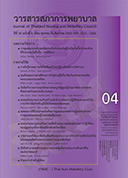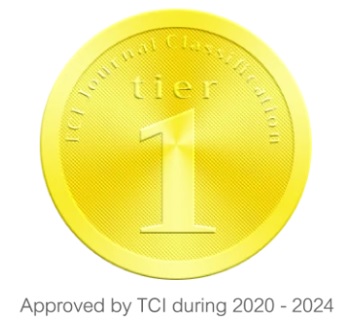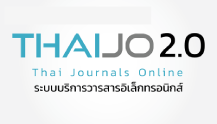Predictors of Distress in Family Caregivers of Neurosurgery Patients during Palliative Care
Keywords:
functional ability, family caregivers’ needs, family caregivers’ preparedness, diagnosis time, distress, neurosurgery patients during palliative careAbstract
Objectives: To examine predictive powers of the patients’ functional ability, the caregivers’ needs, the caregivers’ preparedness, and diagnosis time in relation to the distress experienced by the caregivers of the neurosurgery patients during palliative care
Design: Descriptive predictive study Methodology: This study sample was 109 patients during the 3rd to 5th days of post-neurosurgery palliative care, whose index of activity of daily living was ≤ 75 points, and 109 family caregivers providing the patients with during-hospitalisation and post-discharge care. All of the subjects were receiving treatment at the surgery ward of a tertiary hospital in Northeastern Thailand. The data-collecting instruments consisted of 1) a demographic questionnaire for the patients and their family caregivers; 2) the Palliative Performance Scale for Adult, or PPS (Suandok version); 3) the Problems and Needs in Palliative Care Questionnaire—Caregiver Form, or PNPC-c; 4) the Preparedness for Caregiving Scale; and 5) the Distress Thermometer. Multiple regression statistics with the enter method was used for analysis.
Results: High distress was found in 43.1% of the family caregivers. Functional ability assistance for activities of daily living was needed in 86.2% ( = 30.30, SD = 11.26) of the patients. Most (73.1%) of the family caregivers’ greatest need was the means of caring for the patients ( = 15.48, SD = 3.01), whilst 48.6% displayed a moderate level of care preparedness (48.6%, = 17.96, SD = 7.34). For more than half (62.4%) of the patients, the diagnosis took five days or less (≤ 5 days; = 9.79, SD = 10.66). The factors capable of significantly predicting the family caregivers’ distress were the caregivers’ needs, caregivers’ preparedness, and diagnosis time, respectively (β = .346; β = -.203; β = -.188, p < .05).
Recommendations: Nurses are advised to assess, during the three to five days of palliative care following the patients’ neurosurgery, the caregivers’ distress, assistance needs, and pre- and post-operative care preparedness. This is to ensure the nurses’ readiness to provide the caregivers with prompt and timely help.
References
Earle B, Powell T, Calosso A, Magalee C. Improving relationships: initiating a collaborative project between the neurosurgical care unit and palliative care unit (QI830). J Pain Symtom Manag 2018; 55(2):716. doi.org/10.1016/j.jpainsymman. 2017.12.463
Bhatnagar S, Bharti SJ. Palliative care to neurological and neurosurgical patients. In: Hemanshu P, editors. Essentials of neuroanesthesia. New Delhi: Academic Press; 2017. p. 953-62.
Institute of Prasat Neurological (Thai). Clinical nursing practice guidelines for stroke. Bangkok: Tanapress; 2018.
Kahveci K, Dinçer M, Doger C, Yaricı AK. Traumatic brain injury and palliative care: a retrospective analysis of 49 patients receiving palliative care during 2013–2016 in Turkey. Neural Regen Res 2017;12(1):77-83. doi.org/10.4103/1673-5374.198987.
Russell B, Collins A, Dowling A, Dally M, Gold M, Murphy M, et al. Predicting distress among people who care for patients living longer with high-grade malignant glioma. Support Care Cancer 2016;24(1):43-51. doi: 10.1007/s00520-015-2739-0.
Krikorian A, Limonero JT, Maté J. Suffering and distress at the end of life. Psychooncology 2012;21(8):799- 808. doi: 10.1002/pon.2087.
Parker Oliver D, Washington K, Smith J, Uraizee A, Demiris G. The prevalence and risks for depression and anxiety in hospice caregivers. J Palliat Med 2017;20(4),366-71. doi.org/10.1089/jpm.2016.0372.
Lambert SD, Harrison JD, Smith E, Bonevski B, Carey M, Lawsin C, et al. The unmet needs of partners and caregivers of adults diagnosed with cancer: a systematic review. BMJ SP Care 2012;2(3):224-30. doi.org/10.1136/bmjspcare-2012-000226
National Council for Palliative Care (UK). Palliative care for adults with non-malignant disease: Developing a national policy. London: NPC; 2003
Scaratti C, Leonardi M, Saladino A, Anghileri E, Broggi M, Lamperti E, et al. Needs of neuro-oncological patients and their caregivers during the hospitalization and after discharge: results from a longitudinal study. Support Care Cancer 2017;25(7):2137-45. doi.org/ 10.1007/s00520-017-3619-6.68
Boongnam S, Thosingha O, Chanruangvanich, Itthimathin P. Factors affecting the adjustment process of surgically critical patients’ relatives. Thai Journal of Nursing and Midwifery Council 2015;30(4):72-83. (in Thai)
Launay E, Cohen JF, Bossuyt PM, Buekens P, Deeks J, Dye T, et al. Reporting studies on time to diagnosis: proposal of a guideline by an international panel (REST). BMC Med 2016;14(1):146. doi.org/10.1186/s12916-016-0690-7.
Promrod T, Mankong S, Sirapongam Y. Needs response to needs stress and coping of patients’ relatives before transferring from intensive care units (ICU). Ramathibodi Nursing Journal 2011;17(1):75-89. (in Thai)
McAdam JL, Dracup KA, White DB, Fontaine DK, Puntillo KA. Symptom experiences of family members of intensive care unit patients at high risk for dying. Crit Care Med 2010;38(4):1078-85. doi.org/10.1097/CCM.0b13e3181cf6d94.
Cassidy T, McLaughlin M. Psychological distress of female caregivers of significant others with cancer. Cogent Psychol 2015;2(1):999405. doi.org/10.1080/23311908.2014.999405.
Roy, C. The Roy adaptation model. 3rd ed. Upper Saddle River (NJ): Pearson; 2008.
Polit DF, Beck CT. Nursing research: generating and assessing evidence for nursing practice. Philadelphia: Lippincott Williams & Wilkins; 2008.
Roth AJ, Kornblith AB, Batel‐Copel L, Peabody E,Scher HI, Holland JC. Rapid screening for psychologic distress in men with prostate carcinoma: a pilot study. Cancer 1998;82(10):1904-8. doi.org/10.1002/(sici)1097-0142(19980515)82:10<1904:: aidcncr 13 > 3.0.co;2-x.
Laurujisawat P, Jetiyanuwat S. Validity of the Thai version of the Distress Thermometer. Journal of the Psychiatric Association of Thailand 2018;58(3): 257-70. (in Thai)
Anderson F, Downing GM, Hill J, Casorso L, Lerch N. Palliative Performance Scale (PPS): a new tool. J Palliat Care 1996;12(1):5-11. doi.org/10.1177/082585979601200102.
Chewaskulyong B, Sapinun L, Downing GM, Intaratat P, Lesperance M, Leautrakul S, et al. Reliability and validity of the Thai translation (Thai PPS Adult Suandok) of the palliative performance scale (PPSv2). J Palliat Med 2012;26(8):1034-41. doi.org/10.1177/0269216311424633.
Osse BHP, Vernooij-Dassen MJFJ, Schadé E, Grol RPTM. Problems experienced by the informal caregivers of cancer patients and their needs for support. Cancer Nurs 2006;29(5):378-88. doi.org/ 10.1097/00002820-200609000-00005.
Chiangta S, Chanruangvanich W, Tohsing O, Keskool. Relationship between head & neck cancer patients and their caregivers in term of palliative care needs. Thai Journal of Nursing and Midwifery Council 2017; 32(2):31-48. (in Thai)
Archbold PG, Stewart BJ, Greenlick MR, Harvath T. Mutuality and preparedness as predictors of caregiver role strain. Res Nurs Health 1990;13(6):375-84. doi.org/10.1002/nur.4770130605
Wirojratana V. Development of the Thai Family Care Inventory [Doctoral dissertation]. Portland (OR): Oregon Health & Science Univ.; 2002.
Siqueira EMP, Diccini S. Postoperative complications in elective and non-elective neurosurgery. ACTA Paul Enferm 2017;30(1):101-8. doi.org/10.1590/ 1982- 0194201700015
Mattos JP, Joaquim AF, Almeida JPCD, Albuquerque LAFD, Silva ÉGD, Marenco HA, et al. Decompressive craniectomy in massive cerebral infarction. Arq Neuropsiquiatr 2010;68(3):339-45. doi.org/10.1590/S0004-282X2010000300002.69
Fung C, Murek M, Klinger-Gratz PP, Fiechter M, Z’Graggen WJ, Gautschi OP, et al. Effect of decompressive craniectomy on perihematomal edema in patients with intracerebral hemorrhage. PLoS one 2016;11(2). doi.org/10.1371/journal.pone.0149169.
Song K, Amatya B, Voutier C, Khan F. Advance care planning in patients with primary malignant brain tumors: a systematic review. Front Oncol 2016;24(6):223. doi.org/10/33 89/fonc.2016.00223.
Henriksson A, Årestedt K. Exploring factors and caregiver outcomes associated with feelings of preparedness for caregiving in family caregivers in palliative care: a correlational, cross-sectional study. Palliat Med 2013;27(7):639-46. doi.org/10.1177/0269216313486954.
Nelson MJE, Azoulay PE, Curtis JR, Mosenthal AC, Mulkerin CM, Puntillo K, et al. Palliative care in the ICU. J Palliat Med 2012;15(2):168-74. doi.org/10. 1089/jpm.2011.9599.






